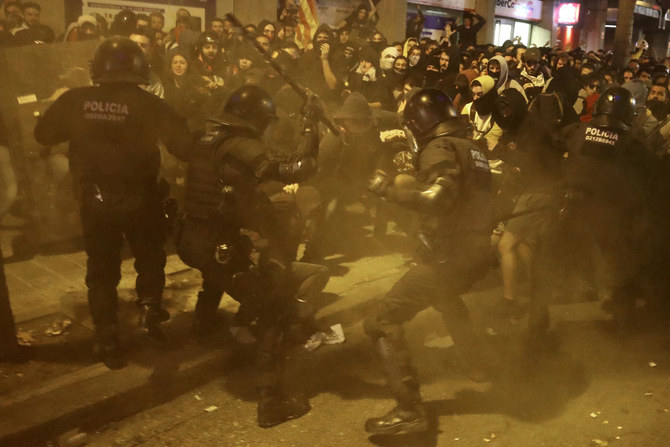BARCELONA: Thousands of demonstrators took to the streets of Barcelona and some clashed with police on Tuesday in a second day of protests over the jailing of nine Catalan separatists by the supreme court for their role in a failed 2017 secession bid.
Pro-independence leaders have vowed to keep pushing for a new referendum on secession, saying Monday’s prison sentences strengthened the movement.
Some Barcelona protesters threw cans and flares at riot police, setting fire to cardboard and other trash in some places. They also tried to kick down security barriers set up around the Spanish government headquarters in the city center.
Police charged the demonstrators with batons, after removing protesters blocking motorways and a train station in the region.
Elsewhere, protesters lit candles and chanted “Freedom for political prisoners” in a rally organized by Omnium Cultural organization, whose chairman Jordi Cuixart was convicted on Monday.
Pro-independence labor union confederation IAC announced a general strike in Catalonia on Friday against labor laws which unions say infringe workers’ rights.
Oriol Junqueras was given the longest sentence, of 13 years, for his role in organizing the 2017 referendum, which was ruled illegal. He told Reuters in his first interview after the sentence that it would only galvanize the independence movement.
“We’re not going to stop thinking what we think, ideals can’t be derailed by (jail) sentences,” he said, saying that a new plebiscite was “inevitable.”
The head of the regional government, Quim Torra, defended the mass protests over sentencing he described as unacceptable.
“A new stage begins where we take the initiative and put the implementation of the right to self-determination back in the center” of our proposals, Torra said, urging Madrid to pay heed and start talks to that effect.
Demonstrators had blocked railways on Monday and thousands descended on Barcelona’s international airport, where some clashed with police. An airport spokesman said 110 flights were canceled on Monday and a 45 more were canceled on Tuesday.
All the defendants were acquitted of the gravest charge, rebellion, but the length of the prison terms — which Junqueras said they planned to appeal in a European court — prompted anger in Catalonia.
Two years after the debacle of the first plebiscite, Catalonia’s independence drive still dominates much of Spain’s fractured political debate, and will likely color a national election on Nov. 10, Spain’s fourth in four years.
Acting foreign minister Josep Borrell said of the issue: “Yesterday, today and tomorrow, it remains a political problem that has to be solved.” He called for dialogue within the framework of the constitution.
GREATER AUTONOMY?
But Borrell said the independence movement had ignored those in Catalonia who were not in favor of breaking away from Spain, saying: “This is a totalitarian attitude.” Separatists have repeatedly rejected such comments.
A dialogue could focus on greater autonomy for Catalonia, possibly within a more federal plurinational framework in Spain, said Santi Vila, one of three sentenced leaders who were not sent to prison.
A known critic of the secessionist agenda who had resigned as Catalan government business counselor just before the independence declaration, Vila called for a new election in the region, something regional government head Torra opposes.
“It looks reasonable that when two governments have such a communication problem ... it’s important to ask citizens if the way being taken is correct or not,” said Vila, 46. While he also supports a referendum, he says it should not be about full independence but self-government powers.
Spain’s main parties have consistently refused to hold an independence referendum in Catalonia, although the acting Socialist government says it is open to dialogue on other issues.
Diana Riba, wife of convicted leader Raul Romeva, told Reuters the independence drive would prevail over time.
“This is a very long process but we will see results as we did with the feminist movement, how they grew until becoming massive and achieving the rights that they were seeking,” she said, calling for “everyone to take to the streets.”
























